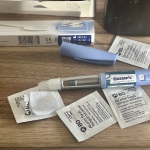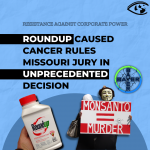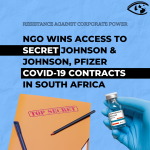War Profiteering: Bayer, Anthrax and International Trade
Editor's note: This article, which lays out the issues surrounding drug patents, WTO rules and public health, was written before the recent WTO meeting in Doha, Qatar. As a result of tenacious negotiating by developing countries at that meeting, poor nations are now allowed to import and export generic drugs in the face of public health emergencies, like the AIDS pandemic. Activists are celebrating this victory, while at the same time pointing out that it is just one exception to WTO rules on intellectual property rights, which remain largely intact. We believe this piece is still timely because it gives context to the fierce fight over drug patenting in the WTO and the implications for both developed and developing countries.
Against the backdrop of the September 11th terrorist attacks in the US, the current anthrax crisis has raised highly controversial issues related to intellectual property rights. Just a few months back, the world witnessed heated debate on the patent controversy when the Pharmaceutical Manufacturers' Association of South Africa took the South African government to court to prevent it from importing cheaper versions of patented AIDS drugs. Under tremendous pressure from health activists around the world, the drug companies unconditionally dropped their lawsuit against the South African government.
No doubt, it is unfair to compare the AIDS pandemic in South Africa with the current anthrax crisis in the US. Compared to over 4.7 million patients suffering from AIDS and nearly 300 AIDS patients dying every day in South Africa, the anthrax crisis in the US has only affected a dozen people and claimed four lives until now. Yet there are several similarities. Not only do both instances relate to public health, but more importantly, the bone of contention revolves around the Trade-Related Intellectual Property Rights (TRIPs) agreement of the World Trade Organization (WTO).
Moreover, both these instances confirm the apprehensions of many developing countries, as well as health activists in the developed world, that drug corporations put profits before public health. They also see drug patents enforced by WTO regime as severely restricting the ability of national governments to take measures to safeguard public health.
The Price of Anthrax Drugs: Scarier Than the Disease
The current controversy on patented drugs started when the first signs of anthrax attacks appeared in US in early October 2001. Ciprofloxacin, an antibiotic drug, is prescribed for patients suffering from anthrax and other bacteria. The German pharmaceutical corporation, Bayer AG, holds the patent for Cipro (the brand name of ciprofloxacin) in the US until December 9, 2003. Under the present TRIPs agreement, no other drug company is allowed to commercially manufacture and sell the generic versions of this drug in the US until the Bayer patent expires, except under extraordinary circumstances.1 Cipro is not only one of the best selling antibiotic drugs in the world, but it also earns mega-profits for Bayer. In the US alone, Bayer sold $1.04 billion worth of Cipro in 1999.
As the spectre of anthrax epidemic loomed large in the public, people started piling up stocks of Cipro. The sudden increase in the demand for Cipro led to a steep hike in its retail prices. With the wholesale prices of Cipro at $4.67 for a 500 mg pill in the US, the retail prices went up to as much as $7 a pill. For anthrax treatment, it is recommended that patients should take two pills a day for 60 days. Thus, the retail price for two months stock of Cipro was well over $700, much beyond the means of poor Americans.
Given the fact that two months stock of a generic version of Cipro costs a fraction of the prevalent price, there was uproar over the monopolistic profits made by Bayer from the public health crisis. In India, for instance, Bayer's Baycip (the brand name of ciprofloxacin in India) is available at drug stores at $0.13 a pill. Thus, the retail price for two months stock of Baycip would be just $17. Whereas two months stock of a generic version of ciprofloxacin is available at a price as low as $8 at drug stores in India.
Meanwhile, in spite of higher prices, Bayer is unable to produce a sufficient supply of Cipro to meet the US demand on short notice. At best, Bayer offered to produce 200 million pills within 60 days, much lower than the requirement of 1.2 billion pills. It would have taken several months for Bayer to meet the requirement.
Confronted with a scenario where panic was spreading like wild fire, the Bush administration should have busted Bayer's patent on ciprofloxacin and allowed sale of generic versions of the drug in the country. There are a host of drug companies (including Ranbaxy, Dr Reddy's Lab, and Cipla in India) which have already received quality approval from the US Food and Drug Administration for manufacturing ciprofloxacin. Many of these companies were not only ready to provide ciprofloxacin to the US within 60 days, but more importantly, they offered it at a fraction of price than what Bayer was charging the Americans.
In fact, there are legal provisions in the US that allow compulsory licensing. Under Federal law, the government can purchase products like ciprofloxacin for official use from manufacturers other than the patent holder during health emergencies. In addition, US law the government is exempt from paying any compensation to Bayer for suspending its patent.
Not only health activists and anti-corporate campaigners in the US are outraged. Even politicians like Charles Schumer, a Democrat senator from New York, strongly demanded the suspension of Bayer's patent. In a letter addressed to US Secretary of Health and Human Services Tommy Thompson, Ralph Nader (consumer advocate and former presidential candidate) along with his colleague, James Love, called on the administration to immediately authorize generic production of ciprofloxacin. In the letter, they pointedly told the US Health Secretary, "your official responsibility is to protect the public's health, and not to defend large profiteering pharmaceutical companies, which are already making a fortune because of our country's current problems. How do you define the patriotic choice here?"
Abject Surrender
Despite extensive domestic support for suspending Bayer's patent on Cipro, the response of Bush administration was outrageous. Tommy Thompson considered it "illegal" to suspend Bayer's patent on Cipro. Instead he entered into negotiations with Bayer with the intention of lowering the price of Cipro. Facing an unprecedented public embarrassment, Bayer agreed to lower the price of Cipro for government purchase from $1.77 to $0.95.
Dubbed as "historic victory" in the US official circles, it would be absurd to view this agreement as a major accomplishment of the Bush administration. Rather, it was a major victory for Bayer which remains the sole supplier of the drug in the US until December 2003. Further, the agreement with Bayer only covers government purchases of Cipro from the company while the drug will be sold at hospitals and drug stores at the regular retail price. Even at a discounted price, Bayer is still making profits from huge orders placed by the health authorities. Meanwhile, perturbed over this lopsided agreement with Bayer, consumer activists in several states have filed a lawsuit asking the court to scrap the agreement that gives monopoly rights to Bayer.
While these developments were taking place, allegations of price manipulations by Bayer have also come to light. It is alleged that the US subsidiary of Bayer AG signed illegal agreements with three of its competitors -- Barr Laboratories, Rugby, and Hoechst-Marion Roussel -- to prevent them from challenging its patent rights over Cipro. According to anti-corporate activists, Bayer has paid a total sum of $200 million to date to these companies for not manufacturing or marketing a generic version of Cipro, thereby neutralizing competition to protect monopoly profits.
Canada's Flip-flop Posture
Watching these developments in the US from a close quarter, neighboring Canada announced on October 18th that it would suspend Bayer's patent on Cipro and allow generic drug manufacturers to sell the drug in the country. The Canadian authorities also approached a domestic generic drug maker, Apotex, to produce one million pills since Bayer was unable to meet the demand for Cipro. Apotex agreed to sell its generic version at $0.95 per pill to the health authorities, which was significantly lower than $1.59 charged by Bayer.
This move by the Canadian health authorities sent shock waves in the entire pharmaceutical industry. The drug industry was taken aback by the sudden change in the Canadian stance because the country had consistently supported the US position on the intellectual property rights in the past. Bayer, in collusion with several lobby organizations, used all kinds of pressure tactics -- including threatening to sue the Canadian government -- to reverse this move. Within hours, Canadian officials reversed their stand and announced that they would honor Bayer's patent on Cipro and would buy the drug only from the company. This sordid episode demonstrates the power of the drug companies and their lobby organizations to stifle competition from low cost generic drug manufacturers.
The US Administration: Hand in Glove with the Drug Giants
The Bush administration did not suspend the patent of Bayer largely because it was more concerned with the wider implications of such an action, particularly on the ongoing negotiations at the WTO. Realizing that scrapping Bayer's patent would set a precedent that could give legitimacy to the growing demands of the poor and developing world for more flexibility on patent issues, the US sent a clear message to the world that patents are more important than public health. Such a calculated move was not only meant to serve the corporate interests of drug manufacturers, but also to convey the message to the developing nations that the US administration would continue its discriminatory policy on the issue of patents.
In international economic negotiations, the US administration has been one of the strongest allies of the global drug industry. Washington played a key role in initiating the Uruguay round of GATT negotiations where several TRIPs agreements on pharmaceuticals were pushed forward. The US has challenged various countries at the WTO tribunal and has even threatened trade sanctions against several countries including Thailand, India, South Africa and Brazil for breaching TRIPs. In the last couple of years, Washington has advocated even more stringent measures for protecting patents under the so-called 'TRIPs-Plus' mechanism.
Wider Ramifications
Several inferences can be drawn from the anthrax crisis in the US. First, the US has unabashedly acknowledged the supremacy of patents over public health, even when its own citizens are concerned. Second, the developed world is not immune to the grave danger to public health posed by WTO rules. This episode should serve as a wake up call to the rest of the developed countries who usually follow the footsteps of the US on patent issues. Poor and ordinary people, irrespective of their location, have a basic right to sound health, and therefore, safeguarding public health must take precedence over patents and monopoly profits of the drug companies.
Third, it is of utmost importance that drug industry monopolies be dismantled to ensure that crucial drugs are made accessible to the poor patients at affordable prices. Therefore, strict regulation of drug corporations must be an integral component of building public health system in the developed as well as the developing world.
Fourth, with critical support from the developed countries not forthcoming, the responsibility for demanding a comprehensive review of TRIPs -- including reduction in the duration and scope of patent protection for essential drugs -- rests with the poor and developing countries. This calls for greater unity and solidarity among the poor and the developed world on issues of common interest at the WTO and other international economic negotiations. It is high time that the primacy of national health policy over international trade agreements, including the WTO, be restored.
Footnotes
Under compulsory licensing, a government can allow local companies to produce cheaper versions of drugs whose patents are controlled by foreign drug companies. Local companies can produce and sell drugs in the country after paying a reasonable royalty on sales to the foreign drug companies. By increasing competition in the market, compulsory licensing can significantly lower the prices of drugs. While parallel importing allows countries to import cheap, generic versions of drugs without permission from the patent holders. For instance, the US government can import drugs from an Indian company to sell them in the country. Since the prices of drugs are lower in several countries, particularly in the developing ones, parallel imports can help in lowering the prices of drugs. Recent experience shows that both these measures can be helpful in promoting access to drugs at affordable prices. But the scope of using these measures is severely restricted under the present TRIPs regime.
CorpWatch's 2001 coverage of the WTO was made possible through the
generous support of the Humanitarian Group for Social Development.
Kavaljit Singh is the Director of Public Interest Research Centre, Delhi. He is also associated with Asia-Europe Dialogue Project.
- 122 Pharmaceuticals



